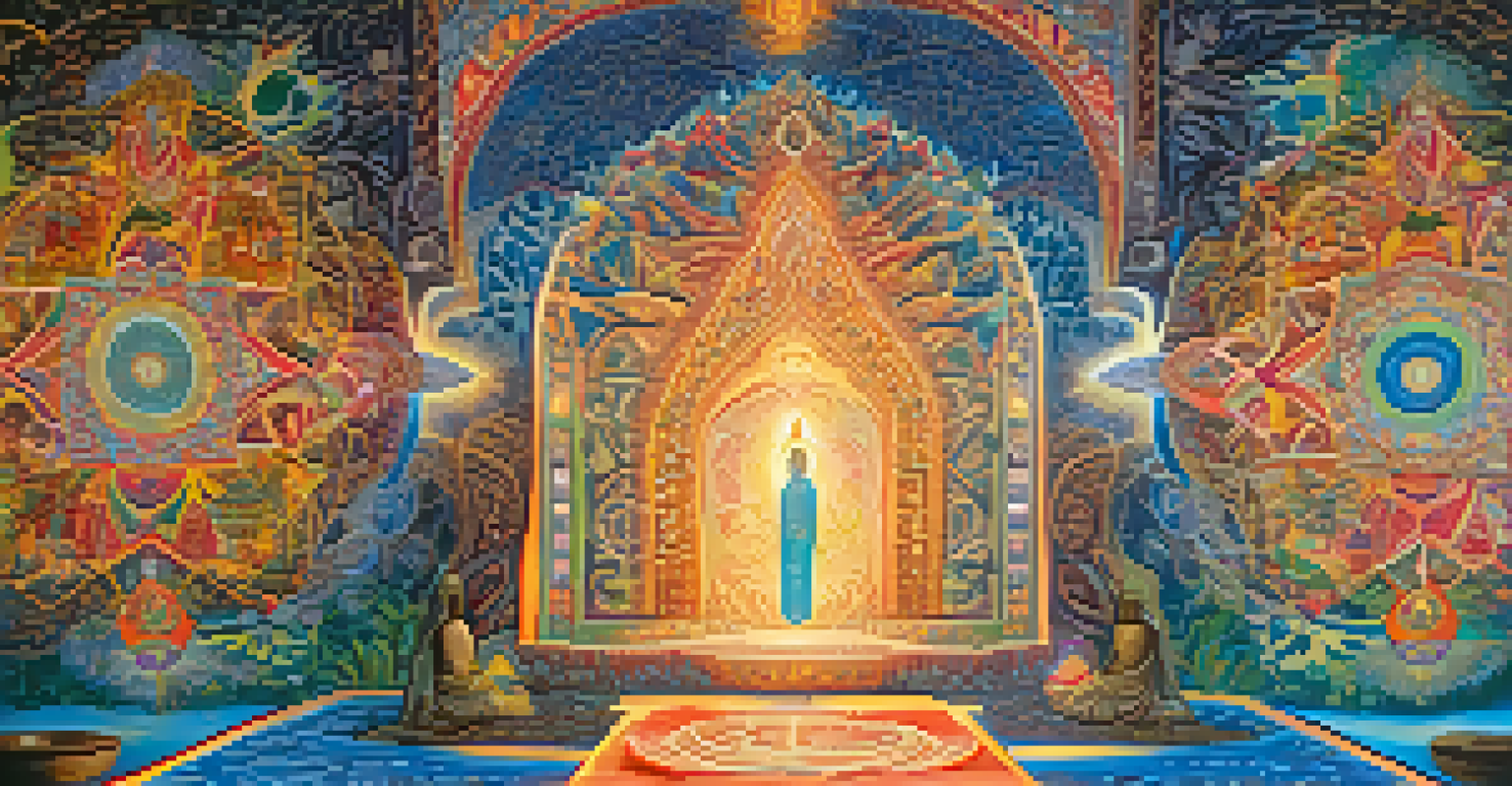Spirituality vs. Religion: Distinguishing Paths to Meaning

Understanding Spirituality: A Personal Journey
Spirituality often refers to an individual's personal quest for meaning, purpose, and connection with something greater than themselves. Unlike organized religion, spirituality is subjective and can vary greatly from person to person. Some may find spirituality in nature, art, or personal meditation practices, while others might explore it through philosophical inquiries.
The spiritual journey is the unlearning of fear and the acceptance of love.
For many, spirituality emphasizes personal experience over doctrine. It encourages individuals to connect with their inner selves and the world around them, often leading to a deeper sense of fulfillment. This journey can be both introspective and transformative, allowing individuals to define what spirituality means to them.
In this sense, spirituality is like a personal tapestry, woven with unique threads of experiences, feelings, and reflections. Just as no two tapestries are the same, no two spiritual paths are alike, making spirituality a deeply individual pursuit that can foster personal growth and understanding.
Defining Religion: Structure and Community
Religion, on the other hand, often involves a structured set of beliefs, practices, and rituals shared by a community. It provides a framework for understanding life, morality, and the universe through established doctrines and teachings. Major religions like Christianity, Islam, and Hinduism have rich traditions that guide their followers in a communal worship experience.

One of the key aspects of religion is the sense of belonging it provides. It fosters community, offering individuals a support system and a shared identity with others who hold similar beliefs. This communal aspect can create strong bonds through shared rituals, festivals, and worship services, reinforcing a collective sense of purpose.
Spirituality is Personal Exploration
Spirituality emphasizes individual experiences and personal growth, allowing each person to define their own path.
Furthermore, religion often addresses existential questions and moral dilemmas, offering guidance on how to navigate life's challenges. Think of it as a map that helps believers navigate their journey through life, providing direction and a sense of security in the face of uncertainty.
Spirituality vs. Religion: Key Differences
While spirituality and religion can overlap, their core differences lie in their focus and structure. Spirituality is more about individual exploration, while religion emphasizes shared beliefs and practices. Spirituality can exist outside of organized religion, allowing for a more fluid and personal interpretation of the divine.
Religion is for people who are afraid of going to hell. Spirituality is for those who have already been there.
Another significant difference is how each approach deals with authority. In religion, authority often rests with sacred texts or religious leaders, guiding followers in their beliefs and practices. In contrast, spirituality encourages individuals to seek their own truths, often disregarding external authority in favor of personal insight.
In essence, spirituality can be seen as a more flexible approach, while religion provides a stable framework. This distinction helps illustrate how people can pursue meaning in diverse ways, whether through personal experiences or communal practices.
Finding Common Ground: Spirituality within Religion
Interestingly, many religious traditions incorporate spiritual elements, allowing followers to experience a deeper connection to their beliefs. For instance, meditation and contemplative practices are common in both Buddhism and Christianity, emphasizing the importance of personal experience within a larger framework. This blending of spirituality and religion can enrich an individual's faith journey.
Moreover, individuals often find ways to integrate their spiritual practices into their religious lives. This could mean engaging in personal meditation before a communal prayer or seeking personal understanding of religious teachings. Such integration fosters a more holistic approach to faith, allowing for both communal and personal growth.
Religion Provides Community Support
Religion fosters a strong sense of community through shared beliefs and practices, offering emotional and social support.
Ultimately, the coexistence of spirituality and religion demonstrates that these paths to meaning are not mutually exclusive. They can complement and enhance each other, creating a richer tapestry of beliefs and practices for individuals seeking fulfillment and understanding.
The Role of Personal Experience in Spirituality
Personal experience is a cornerstone of spirituality, shaping how individuals relate to the world and their understanding of the divine. Many people report moments of insight, peace, or connection that deeply influence their spiritual beliefs. These experiences often serve as guiding lights, helping individuals navigate their spiritual paths.
For example, someone might feel a deep sense of peace while hiking in nature, leading them to adopt a more nature-based spirituality. Such moments can foster a sense of belonging to something larger, enhancing one’s understanding of self and the universe. This relationship between personal experience and spirituality can lead to profound transformations.
In this way, personal experiences act as signposts on a spiritual journey, guiding individuals toward greater self-awareness and understanding. They remind us that spirituality is not just a set of beliefs, but a dynamic process influenced by the richness of our lived experiences.
The Community Aspect of Religion: Support and Belonging
One of the most appealing aspects of religion is the sense of community it fosters. Many individuals seek out religious groups for the shared values, support, and belonging they provide. This communal connection can offer emotional, spiritual, and social support during times of need, creating a network of care and understanding.
Religious communities often come together for worship, celebrations, and service, reinforcing bonds through shared practices and beliefs. These gatherings can create a sense of unity and purpose, providing individuals with a collective identity that goes beyond personal experience. It’s a reminder that we are not alone in our beliefs and struggles.
Both Paths Offer Unique Insights
Navigating spirituality and religion allows individuals to explore diverse beliefs and find meaning in their lives.
In contrast, those on a spiritual path may not always find the same level of community support. While spiritual groups exist, they can sometimes lack the structure and consistency that religious organizations provide. This highlights a key distinction: while spirituality can be a solitary journey, religion often thrives on communal engagement and shared experiences.
Navigating the Spectrum of Belief: A Personal Choice
Ultimately, the choice between spirituality and religion—or a blend of both—lies in personal preference. Each individual must navigate their own path based on what resonates with them. Some may find solace in structured religious practices, while others may feel more fulfilled by exploring their spirituality independently.
This spectrum of belief allows for a rich diversity of experiences, encouraging individuals to seek what feels right for them. It’s essential to recognize that both paths offer valuable insights into the human experience, helping us grapple with life’s big questions and find meaning in our journeys.

As we explore spirituality and religion, we learn that there’s no one-size-fits-all approach. Embracing this diversity can lead to a deeper understanding of ourselves and those around us, fostering a more compassionate and open-minded perspective on the various paths we all take in search of meaning.